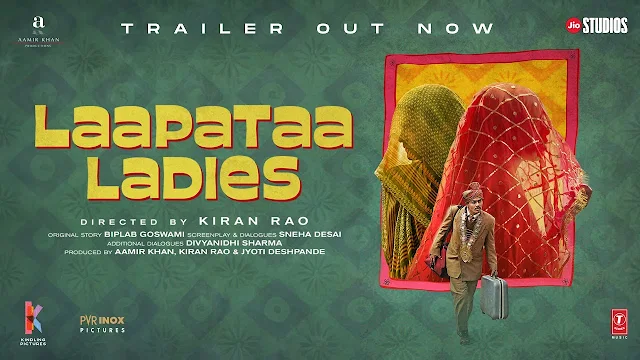Unveiling Feminist Narratives: Empowerment Through Cinematic Journeys
महिलावादी आख्यानों का अनावरण: सिनेमाई यात्राओं के माध्यम से सशक्तिकरण
In the midst of cinematic realms, emerges a tapestry of feminist narratives that resonate profoundly with our lived experiences. This exploration delves into the transformative journeys of Phool Kumari from "Laapataa Ladies" and Bella Baxter from "Poor Things," weaving a narrative of empowerment and defiance against societal constraints.
सिनेमाई क्षेत्र के बीच में, नारीवादी आख्यानों की एक टेपेस्ट्री उभरती है जो हमारे जीवन के अनुभवों से गहराई से मेल खाती है। यह अन्वेषण "लापाता लेडीज" से फूल कुमारी और "पुअर थिंग्स" से बेला बैक्सटर की परिवर्तनकारी यात्राओं पर प्रकाश डालता है, जो सामाजिक बाधाओं के खिलाफ सशक्तिकरण और अवज्ञा की कहानी बुनती है।
The Narrative Thread of Empowerment:
Phool Kumari's story, set against the backdrop of 2001, unfurls the intertwined destinies of two young brides lost on a train journey. In the echoes of Phool's mother-in-law's dismissive question—"Do women cook for themselves?"—resides a profound reflection of societal expectations that women must prioritize others over their own desires. This poignant moment reverberates with personal anecdotes, echoing the sacrifices made by generations of women to uphold familial harmony at the cost of their own autonomy.
सशक्तिकरण की कथा सूत्र:
2001 की पृष्ठभूमि पर आधारित फूल कुमारी की कहानी, एक ट्रेन यात्रा में खो गई दो युवा दुल्हनों की आपस में जुड़ी नियति को उजागर करती है। फूल की सास के तिरस्कारपूर्ण सवाल की गूँज में - "क्या महिलाएँ अपने लिए खाना बनाती हैं?" - सामाजिक अपेक्षाओं का गहरा प्रतिबिंब है कि महिलाओं को अपनी इच्छाओं पर दूसरों को प्राथमिकता देनी चाहिए। यह मार्मिक क्षण व्यक्तिगत उपाख्यानों से गूंजता है, जो अपनी स्वायत्तता की कीमत पर पारिवारिक सद्भाव को बनाए रखने के लिए महिलाओं की पीढ़ियों द्वारा किए गए बलिदानों की प्रतिध्वनि है।
Parallel to Phool's narrative, Bella Baxter's saga in "Poor Things" unveils a Victorian-era defiance against societal norms. Bella, resurrected with a childlike mind, embarks on a journey of self-discovery, challenging the patriarchy's rigid constructs with unabashed sexuality and unapologetic curiosity. Her refusal to conform to societal dictates mirrors a timeless struggle for agency and self-determination.
फूल की कहानी के समानांतर, "पुअर थिंग्स" में बेला बैक्सटर की गाथा सामाजिक मानदंडों के खिलाफ विक्टोरियन युग की अवज्ञा को उजागर करती है। बेला, एक बच्चे जैसे दिमाग के साथ पुनर्जीवित, आत्म-खोज की यात्रा पर निकलती है, जो पितृसत्ता की कठोर संरचनाओं को बेशर्मी से कामुकता और अप्राप्य जिज्ञासा के साथ चुनौती देती है। सामाजिक आदेशों के अनुरूप उनका इनकार एजेंसी और आत्मनिर्णय के लिए एक कालातीत संघर्ष को दर्शाता है।
Intersecting Realities:
Embedded within these cinematic narratives are reflections of real-life struggles against patriarchal structures. The societal favoritism towards men, perpetuated through traditions like arranged marriages, echoes the commodification of women as mere transactions. Even in modern times, women are expected to juggle professional pursuits with domestic duties, reinforcing a cycle of male dominance within households.
परस्पर विरोधी वास्तविकताएँ:
इन सिनेमाई आख्यानों में पितृसत्तात्मक संरचनाओं के खिलाफ वास्तविक जीवन के संघर्षों के प्रतिबिंब अंतर्निहित हैं। पुरुषों के प्रति सामाजिक पक्षपात, जो व्यवस्थित विवाह जैसी परंपराओं के माध्यम से कायम है, महिलाओं के मात्र लेन-देन के रूप में उपभोग की भावना को प्रतिध्वनित करता है। आधुनिक समय में भी, महिलाओं से अपेक्षा की जाती है कि वे घरेलू कर्तव्यों के साथ-साथ पेशेवर गतिविधियों को भी निभाएं, जिससे घरों में पुरुष प्रभुत्व का चक्र मजबूत होता है।
Yet, amidst these societal norms, emerge tales of defiance and resilience. Phool and Bella embody the spirit of rebellion, each carving their path towards emancipation. Phool's realization, mirrored in personal anecdotes, serves as a poignant reminder of the intergenerational transmission of societal expectations, while Bella's defiance inspires a reclamation of autonomy and agency.
फिर भी, इन सामाजिक मानदंडों के बीच, अवज्ञा और लचीलेपन की कहानियाँ सामने आती हैं। फूल और बेला विद्रोह की भावना का प्रतीक हैं, प्रत्येक मुक्ति की दिशा में अपना रास्ता बनाते हैं। फूल का एहसास, व्यक्तिगत उपाख्यानों में प्रतिबिंबित, सामाजिक अपेक्षाओं के अंतर-पीढ़ीगत संचरण की एक मार्मिक याद दिलाता है, जबकि बेला की अवज्ञा स्वायत्तता और एजेंसी की पुनः प्राप्ति को प्रेरित करती है।
A Spectrum of Feminism:
"Poor Things" and "Laapataa Ladies" stand as beacons at two ends of the feminist spectrum, united by their celebration of men who defy traditional gender roles without being pedestaled. Bella finds solace in surgical pursuits, while Phool's liberation lies in letting go of her veil, symbolizing a release from societal constraints.
नारीवाद का एक स्पेक्ट्रम:
"पुअर थिंग्स" और "लापाता लेडीज़" नारीवादी स्पेक्ट्रम के दो छोरों पर प्रकाशस्तंभ के रूप में खड़े हैं, जो उन पुरुषों के उत्सव से एकजुट हैं जो बिना किसी पदचिह्न के पारंपरिक लिंग भूमिकाओं को चुनौती देते हैं। बेला को सर्जिकल गतिविधियों में सांत्वना मिलती है, जबकि फूल की मुक्ति उसके घूंघट को हटाने में निहित है, जो सामाजिक बाधाओं से मुक्ति का प्रतीक है।
Ultimately, these cinematic narratives transcend mere entertainment, offering profound reflections on gender, autonomy, and societal expectations. Through the lens of Phool and Bella's journeys, we're reminded of the enduring quest for empowerment and the transformative power of defiance in the face of adversity.
अंततः, ये सिनेमाई आख्यान मात्र मनोरंजन से परे हैं, लिंग, स्वायत्तता और सामाजिक अपेक्षाओं पर गहरा प्रतिबिंब प्रस्तुत करते हैं। फूल और बेला की यात्राओं के माध्यम से, हमें सशक्तिकरण की स्थायी खोज और विपरीत परिस्थितियों में अवज्ञा की परिवर्तनकारी शक्ति की याद आती है।



